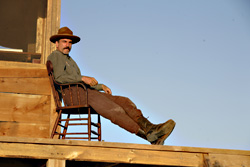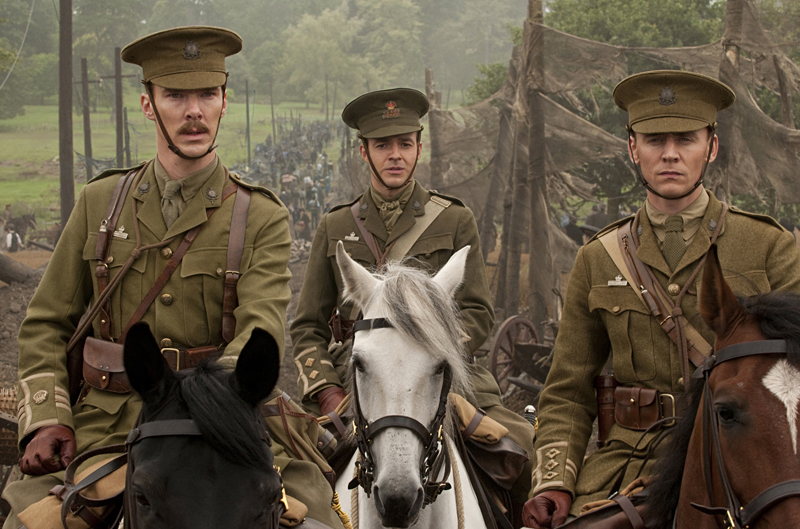A great brooding thundercloud of a movie, Paul Thomas Anderson’s There Will Be Blood arrives as if from nowhere on a gust of critical acclaim, lowering over a landscape of barren mesas and hot, scrubby hills. Anderson’s epic, no less than his career, is both fearfully grandiose and wonderfully eccentric. A strange and enthralling evocation of frontier capitalism and manifest destiny set at the dawn of the 20th century, There Will Be Blood recounts the tale of a ferociously successful wildcat oil driller with the allegorical handle Daniel Plainview (Daniel Day-Lewis). The telling is leisurely and full of process: From the deliberately dark and fragmented prologue to the wildly excessive denouement, this movie continually defamiliarizes what might sound like a Giant-style potboiler.
A terrain of instant desert settlements, conical industrial installations, and scuttling motor vehicles, Anderson’s central California suggests an alien planet—but then, that’s pretty much what the American West was. Plainview is introduced as a solitary miner in 1898 who breaks his leg prospecting for gold and, crawling out of the shaft on his back, manages to stake his claim. Presently, this fantastically self-willed man is seen traveling the West with a small boy (Dillon Freasier), whom he introduces as his partner and son. Attempting to convince squabbling landowners to lease their property for oil exploration, Plainview presents himself as a progressive businessman who jovially proposes to improve—as well as enrich—the entire community.
Surely the most offbeat adaptation of an American novel in the decade since Terrence Malick treated James Jones’ The Thin Red Line as a transcendentalist manifesto, There Will Be Blood is taken from Upton Sinclair’s panoramic 1927 novel, Oil! Sinclair’s muckraker begins with the California oil boom of the 1890s and marches through World War I, the Russian Revolution, and the Harding administration. The amiable oilman is already rich and fixed in his ways; Sinclair’s protagonist is his sensitive young son.
Anderson narrows the novel’s cast as well as its chronological focus, tunneling into Plainview’s backstory. Nevertheless, There Will Be Blood is genuinely wide-screen, both in its mise-en-scène and concern with American values—God, oil, family—that have hardly receded into the mist. This story of profits versus prophets could also be articulated as a death-struggle identification between the two. The narrative proper begins when a mysterious youth named Paul Sunday (Paul Dano) appears out of the night to tip Daniel off to an unexploited oil field on his family’s land back in the hills. He then disappears from the movie—or rather he reappears in those hills as his twin brother, Eli (also Dano), a precocious, charismatic faith healer “sucking out” arthritis from an old lady’s arm the way Daniel sucks black gold out of the earth.
Plainview also turns out to have a brother (played by Kevin O’Connor as Day-Lewis’ weaker double) whose surprise appearance allows the oilman to elaborate on his harsh philosophy of life. Enunciating each line with the certainty of someone engraving his words in stone, Day-Lewis projects a fearsome intensity comparable to his performance in Gangs of New York—for most of the movie, however, it’s mercifully tempered by an equally powerful restraint. Craggy features accentuated by a wide-brimmed hat, Plainview has the glittering eye of incipient madness; midway through, around the time that his boy is deafened by an oil-well explosion, his rotund, oratorical tone turns oracular. As though providing a flash-forward to subsequent California corruption, Day-Lewis begins channeling the overripe, ineffably sinister John Huston of Chinatown.
Nor is that Anderson’s only film reference. Whereas the impudent director challenged Scorsese and Altman with his ensemble epics Boogie Nights and Magnolia, here he seems to have Orson Welles in his sights. No less than the archetypal tycoon Charles Foster Kane, Daniel Plainview deserves to have his name followed by the epithet “American.” Plainview is a visionary materialist and the loneliest of lone wolves, not to mention a self-invented entrepreneur and the very embodiment of D.H. Lawrence’s formula for our essential national character: “hard, stoic, and a killer.”
The past few months have hardly lacked for audacious exercises in cine-hubris—The Assassination of Jesse James, Southland Tales, and I’m Not There, to name three excellent examples—but, as bizarre as it often is, There Will Be Blood is the one that packs the strongest movie-movie wallop. This is truly a work of symphonic aspirations and masterful execution. Anderson’s superb filmmaking is complemented throughout by Radiohead guitarist Jonny Greenwood’s excellent score—at once modernist and rhapsodic, full of discordant excitements, outer-space siren trills, and the rumble of distant thunder.
There’s hardly a dull moment. Digs collapse, gushers burst into flame, God metes out punishment, and so does man. Revelations overturn the narrative: The last 20 minutes are as shocking in their way as the plague that rains from the sky in Magnolia‘s finale. By the time the closing words “There Will Be Blood” appear (with a burst of Brahms) inscribed in heavy gothic letters on the screen, Anderson’s movie has come to seem an Old Testament story of cosmic comeuppance and filicidal madness—American history glimpsed through the smoke and fire that the lightning left behind.








